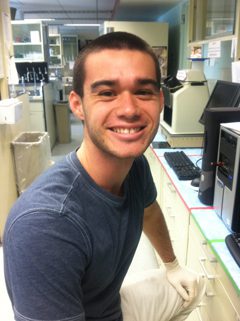Mark Mullan Rose Hills
High-Throughput Screen for Antibiotic Compounds to Target the Initial Enzymatic Steps of Respiratory Sulfate Reduction
Water injection into oil reservoirs is a commonplace practice used to increase oil production beyond primary yields. Seawater is most commonly used, which creates conditions conducive to the activity of sulfate-reducing microorganisms (SRM) within the reservoir. Once established, SRM can generate immense quantities of hydrogen sulfide as a metabolic byproduct, resulting in various oil recovery problems including oil reservoir souring, crude oil contamination, and metal corrosion that later leads to oil pipeline explosions. Overall, microbial hydrogen sulfide production poses numerous environmental and public health issues, and represents a multimillion dollar annual revenue loss in the oil industry.The primary objective of this high-throughput screen is to identify compounds, out of library of tens of thousands of small molecules, that are specific inhibitors of the first three enzymatic steps of microbial sulfate reduction, to allow for the development of low cost, highly effective, and specific controls of biosouring in oil reservoirs.
Message To Sponsor
This opportunity means the world to me! I participated in SURF/Rose Hills last summer and always cite it as the best experience I have had during my three years at UC Berkeley. I feel very honored and humbled to be supported by the Rose Hills Foundation again this summer. Enabling undergraduates to work fulltime in a laboratory setting for months, sans fiscal concerns, gives us all a truly unique experience. I hope to continue gaining insight from the other extremely accomplished SURF/Rose Hills scholars, as well as hone my own research, writing, and presentation skills in preparation for graduate school.